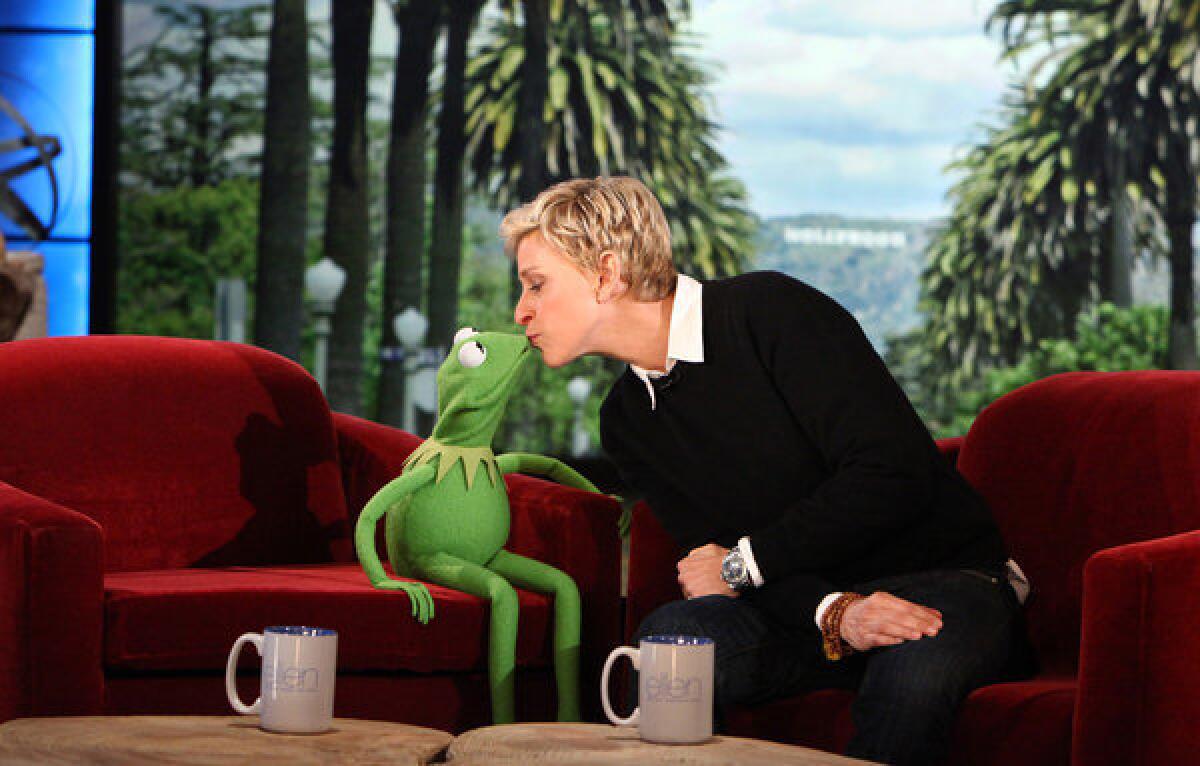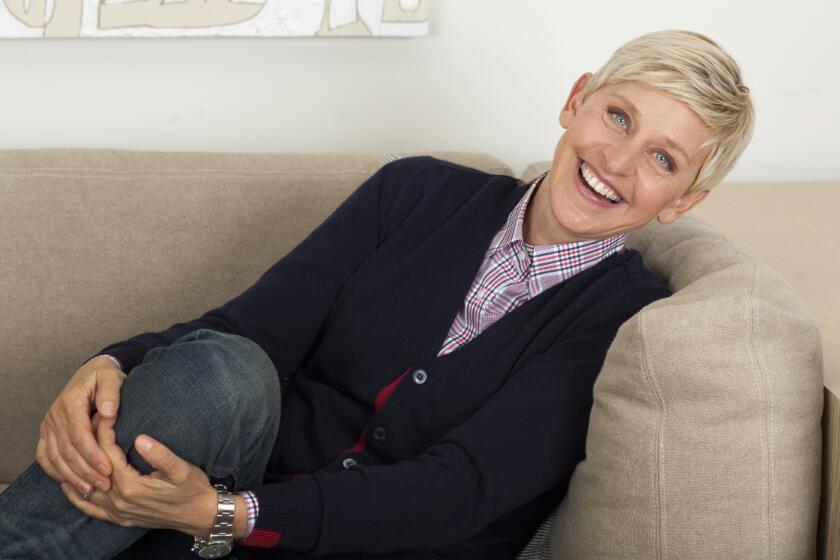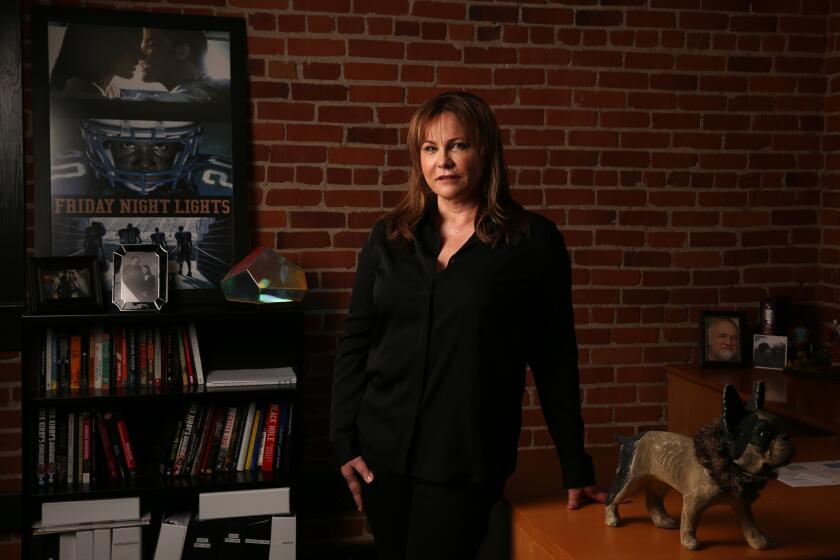Surprised a ‘nice’ talk show like ‘Ellen’ is toxic? TV’s been warning you for years

- Share via
This week, Ellen DeGeneres attempted — successfully? who can yet say? — to turn the page on a bad chapter in the book of her career, one that began last month with a pair of BuzzFeed pieces alleging a toxic work environment on the set of her daytime talk-dance-and-presents fest “The Ellen DeGeneres Show,” including sexual harassment and racist comments on the part of executive staff. (DeGeneres herself was accused only of allowing it to happen, and of being weird — not wanting to be looked at or spoken to and such.) Two producers and a head writer have been let go, a reportedly teary DeGeneres announced Monday on a video conference call to staffers.
Since the story broke, the star has made various statements of appreciation and remorse, taken responsibility, promised “to do my part” and “change and grow,” and reiterated her original desire for a show that would be “a place of happiness — no one would ever raise their voice, and everyone would be treated with respect.”
The latest instance of employees increasingly speaking truth to employers, or speaking truth to reporters about employers, it has seemed especially fraught because of the host’s nice-gal image, and the positivity she so assiduously cultivates. (“Be kind to one another” is her sign-off.) That a celebrity one loves may not in fact be lovable feels like a betrayal, an insult added to injury. Some commentators swear that DeGeneres’ awfulness has been an open secret for ages; it’s not one I ever heard. But I loved her sitcom.
In the olden, golden days of the Hollywood studio system, battalions of publicity agents labored to control a star’s public image, to craft them into something at once glamorous and ordinary, thrilling yet unthreatening, with a heavy lid over even the intimation of any deviation from “the norm.” Inevitably, the practice of selling the public personalities too good to be true ran into the business of revealing them as all too human — gossip columnists and scandal mags like Confidential made this their meat — and this tension exists to this day.
YouTube swarms with videos meant to tell us that famous people are not who they want us to think they are. Celebrities Who Are Not Nice is a genre of its own — usually the same small pool of suspects, hung on not always substantial evidence. DeGeneres gets whole videos to herself, many posted just this year as Ellen Disfavor Fever mounted: “Top 10 Times Celebs Clapped Back at Ellen.” “Top 10 Most Awkward Ellen Moments,” “Top 10 Times Ellen DeGeneres Got Exposed,” “Ellen DeGeneres Is a Hollywood PSYCHO.” The presenters strike a tone, usually unconvincing, between shock and concern, with a little snark sprinkled on top. (In the midst of all this, the news went around — I can’t say it was reliable, but it went around — that “Late Late Show” host James Corden was being looked at to take over the “Ellen” slot, which occasioned a raft of comments that he is not supposed to be very nice either.)
After a wave of complaints from those working on the comedian’s long running show, three top producers depart.

As for the moments in which DeGeneres’ onscreen behavior is reputed to have “exposed” her true nature, viewers of the show have not deserted the host over her having been a little weird with Dakota Johnson about not being invited to her birthday party, or her attempt — a dozen years ago, but hauled out in the latest round of bad press — to force Mariah Carey to announce her pregnancy by trying to get her to drink Champagne on the air. None of the reports that I’ve read or watched mention the fact that Carey has been back to the show since.
The notion that show business might not be all it’s cracked up to be is a notion often put ’round by the business itself, in backstage comedies, dramas and memoirs. “All the sincerity in Hollywood you could stuff in a flea’s navel,” comedian Fred Allen famously remarked, “and still have room left to conceal eight caraway seeds and an agent’s heart,” which is a funny line, a frightening thought and easy to suspect is true, in part because we have heard that story for years.
When the industry looks at itself, it is often askance. Whether the setting is the stage, a movie studio or a TV network, the characters are well known to us: meddling producers, tyrannical directors, impossible stars, bitter and cynical writers who go on to write with cynical bitterness of their experiences. F. Scott Fitzgerald wrote 17 short stories about hack screenwriter Pat Hobby even as he was himself trying to make a go of screenwriting. To S.J. Perelman, who co-wrote two Marx Brothers pictures and “Around the World in 80 Days,” Hollywood was “a dreary industrial town controlled by hoodlums of enormous wealth, the ethical sense of a pack of jackals, and taste so degraded that it befouled everything it touched.”
“The Bad and the Beautiful,” “Barton Fink,” “Swimming With Sharks” and “The Player” have all taken aim at Hollywood; “Network” took a scalpel to television news. Elia Kazan’s 1957 film “A Face in the Crowd” — with a pre-Mayberry Andy Griffith as a vagabond who becomes an influential national TV personality, his folksy charm masking utter disdain for his audience — has been often mentioned as a metaphor for the Trump era. Griffith’s character is brought down in the end by a hot microphone, as he dismisses them as “morons,” “slobs” and “trained seals. I toss ’em a dead fish and they’ll flap their flippers.”
Television has also taken its business as a subject. Around the turn of the century, there were Darren Star’s “Grosse Pointe,” a wicked take on the production of his own “Beverly Hills, 90210,” and Fox’s acid “Action,” with Jay Mohr as a studio head recovering from a catastrophic flop and Illeana Douglas as the child star-turned-prostitute he makes his head of production.
Long before either, yet especially resonant in this moment, was the highly regarded, short-lived “Buffalo Bill,” a resolutely hardhearted 1983-84 sitcom, with Dabney Coleman as the popular host of a local talk show, as awful offscreen as he is lovable on. In one episode, Geena Davis, as a production assistant, describes him cheerily to an interviewer, in words that might have been spoken yesterday, in a less chirpy tone, somewhere in this town: “Bill can be crude, and hateful. … He doesn’t mean to be as petty and prejudiced as he is, he just never really learned to like people. On the other hand, he’s very nice to me, so there’s hope. And lately, he never tries to get me into bed with him. ... This is all very therapeutic for me.”
That would play differently today, on television and in the world. TV hosts Matt Lauer, Charlie Rose and Tavis Smiley, the last just ordered to pay PBS $2.6 million in damages, all lost jobs and status over sexual harassment. Lauer seems superficially to be the inspiration for Steve Carell’s cashiered breakfast show cohost on Apple TV+’s “The Morning Show,” currently nominated for a clutch of Emmys. The series was inspired by Brian Stelter’s book “Top of the Morning: Inside the Cutthroat World of Morning TV,” and it is indeed rife with scheming and double-dealing as characters strive to keep their jobs or move into someone else’s, before a principled stand is finally taken. Working in TV, the series says, might break your heart or warp your values, but it is not beyond hope.
Showrunner Kerry Ehrin took the helm of Apple’s “The Morning Show” after it was underway — and decided to make #MeToo central to the story.
No series captures this doubleness better than Garry Shandling’s “The Larry Sanders Show,” from back in the 20th century, a comedy set at a late-night talk show. We understand on a formal level that Larry lives in two worlds: onstage, with guests, where he is in control (shot on video), and anywhere else (shot on film), where he is not. Still, the character is too conflict-averse — he literally turns away from confrontation — and too needy to be an active tyrant. Shades of “The Ellen DeGeneres Show,” it’s his producer, Artie (Rip Torn), who maintains the perimeter (and bullies him a little, deferentially). Most every character on the show lives at least a little bit in fear.
Authenticity, and the lack of it, was a concern of Shandling’s; he told me in 2010 when the complete series was released on home video that “Sanders” was conceived as a way of “looking internally at myself, which meant taking a show and looking at it internally. And what better show to do that with than a talk show, which pretends to be a normal conversation, half-acknowledging that people are watching and half-pretending that the host and the guest have a certain intimacy, which really revolves around plugging product.”
Guest stars, appearing as themselves, played against their public image, sometimes in a negative way. DeGeneres was on that show, playing a version of herself; interestingly, in a pre-echo of DeGeneres’ pressing Carey to reveal her pregnancy, she finds herself pressured by Larry to announce on camera whether she’ll be coming out on television. (In life, she already had.) “Let’s just be real,” Larry says to Ellen during a commercial break, after a frustrating first segment, and when they come back she details how they slept together the night before.
More to Read
The complete guide to home viewing
Get Screen Gab for everything about the TV shows and streaming movies everyone’s talking about.
You may occasionally receive promotional content from the Los Angeles Times.









